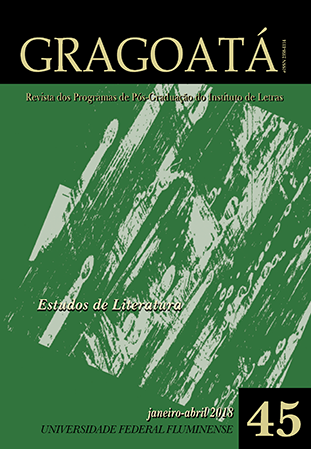“Walahé!”; “You should have seen it”: Validating the Truth of Wartime Absurdities in Ahmadou Kourouma’s Allah is Not Obliged
DOI :
https://doi.org/10.22409/gragoata.v23i45.33563Mots-clés :
Ahmadou Kourouma, absurd, child soldier, satire, Allah is Not Obliged.Résumé
Ahmadou Kourouma’s Allah is Not Obliged is a fiction based on the civil wars in the West African countries of Liberia and Sierra Leone as a result of the breakdown of democracy. It employs the point of view of a child narrator, Birahima, a literalist picaro, to narrate wartime atrocities. The novel, mainly a satire, employs the devices of irony and humour that allow Birahima to present his world, which is turned upside down, and morality, reversed, in a way that makes the reader laugh in spite of the horror. The reality of Birahima’s wartime experience, which has left him in a kind of developmental “limbo”, is difficult to believe to be true. However, he makes every effort in his use of language to prove the truthfulness of the absurdity he narrates. This paper considers how the protagonist/narrator Birahima’s entry into war leaves him in an absurd, cyclical limbo while he resorts in frustration to validate his absurd experience through appealing to God, folk wisdom and dictionaries.
---
Original in English.
---
Téléchargements
Téléchargements
Publiée
Numéro
Rubrique
Licence
AUTORIZAÇÃO
Autores que publicam em Gragoatá concordam com os seguintes termos:
Os autores mantêm os direitos e cedem à revista o direito à primeira publicação, simultaneamente submetido a uma licença Creative Commons Atribuição 4.0 Internacional (CC BY 4.0), que permite o compartilhamento por terceiros com a devida menção ao autor e à primeira publicação pela Gragoatá.
Os autores podem entrar em acordos contratuais adicionais e separados para a distribuição não exclusiva da versão publicada da obra (por exemplo, postá-la em um repositório institucional ou publicá-la em um livro), com o reconhecimento de sua publicação inicial na Gragoatá.
A Gragoatá utiliza uma Licença Creative Commons - Atribuição CC BY 4.0 Internacional.











